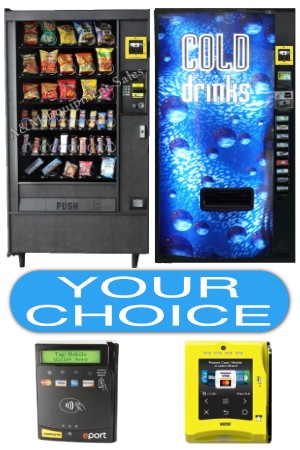How the Vending Business has Changed An interview with Jimmy Bryan of Eagle Vending
Jimmy has been in the vending business for 29 years and runs 18 routes in the Atlanta area.
How the Vending Business has Changed What changes have you seen in the vending business?
Over the last 10 years there’s been a gradual decline in buildings and stores being built, so fewer opportunities are available to place our equipment. There are a number of issues:
- Reduction in work forces
- Down turn in the economy has been tough
- Healthy snacking and nutritional issues has had an impact
- Sales are stable now, so no more reductions but no growth either
There’s more going on with technology now that will have a positive impact on our business:
- Validators now accept higher bills with bill recyclers
- Credit card fees aren’t justifiable yet
- Micro markets – the unmanned stores are coming
- Handheld computers that download sales data for better merchandising
- Reducing energy consumption and recycling is a new trend for vending machines
What do you see in the forseeable future?
- Remote monitoring brings the ability to monitor real time data so the operator knows exactly what sells at a location and what doesn’t, but it’s costly right now
- Yes the marketplace is changing and those who can grow with it will adapt How the Vending Business has Changed You can see another episode of the Vending Business Show School Vending Machines Have A Healthy Option
Listen to the interview:
Episode Transcript:
Tom Shivers: I’m Tom Shivers with the Vending Business Show, here with Jimmy Bryan of Eagle Vending. He’s been in the vending business for 29 years, and runs 18 routes in the Atlanta area. Today we’re going to talk a little bit about how the vending business has changed.
Tom Shivers: So, Jimmy, thanks for being here.
Jimmy Bryan: Great, glad to join you.
Tom Shivers: What changes have you seen in the vending business, especially I guess more relevant in today’s market?
Jimmy Bryan: Well, over the last 29 years there’s been huge changes. Back many years ago, there was almost continuous growth and new buildings going up, and companies adding employees, and lots of industrial blue collar locations. And we’ve seen over the last 10 years or so, a gradual decline in many of those. You don’t see too many home depot stores being built, or plants, or factories going up. It’s just the opposite. You’ve got closings and reductions in workforces, and shopping centers closing down.
Jimmy Bryan: So, there’s just fewer places for us to place equipment than there was years ago. The downturn in the economy we’ve seen over the last three to four years has been particularly tough on us. We’ve probably lost 15% of our base of accounts because of what we’ve gone through. And in addition to that, we see issues with healthy snacking and drinking, that’s had an impact on our business. And schools look like they’re going to be addressing some of their concerns with childhood obesity, which is also going to have a negative impact on vending sales.
Jimmy Bryan: And I think the per capita consumption at the average location is down as far as money that goes into vending machines, and that’s just because of the workplace, and concerns over nutritional issues, and they way people stop on the way to work and get a cup of coffee. So, all those things combined have had a downward pressure on our overall sales.
Jimmy Bryan: Currently where we’re at, it’s fairly stable, just like what you hear with the economy and the stock market, it’s kind of leveled off. So, we’re not seeing reductions, but we’re not seeing a lot of growth either. There’s probably more going on now as far as technical, or technology issues than any time in the past. So, I think that’s going to have a positive impact on our business.
Tom Shivers: Oh, really? What do you mean in terms of technology?
Jimmy Bryan: Well, if you go back many years ago, we started putting validators on all machines. Now we’re seeing just about the majority of our machines going out of our warehouse take ones, twos, fives, and in some cases take tens with bill recyclers. Credit cards are growing, but the fees that we get hit with on the credit card sales make it somewhat difficult to expand that in all areas, which is a problem, because so many young people today don’t carry much cash with them, and it would be great if all vending machines took credit cards. But the fees are so significant that it would almost require an across the board price increase.
Jimmy Bryan: So, I think as time goes on you’ll see more and more credit cards, and hopefully the fees will become more manageable, and more accepted. And you know, then there’s issues, the micro markets is a new thing that’s coming out. The unmanned C Store concept, I think that’s going to be a growing area going forward where vending operators are going to have to add that to their ability to service locations. And I think there’s some exciting things with that, but you know, you’ve got to be able to handle that technology and that merchandising.
Jimmy Bryan: We’ve recently moved into handheld computers, where we’re downloading sales data, called Dexing. And we think that’s going to help us in terms of being able to [inaudible 00:04:33] at some point in time, and also merchandising gives you great information in that regard. So, a lot of smaller operators might find that difficult to start off with. But I think that’s going to become more and more commonplace.
Jimmy Bryan: And then there’s areas like customers will come to us wanting options on reducing energy consumption, and recycling. And I think those are becoming key areas of concern along with some many of our accounts have someone in charge of nutrition, or wellness. And we’re seeing more and more requests for what can you do to provide our employees, or our associates, with healthy options for their drinks, and their snacks, and their cold food, and all? So, those are areas that are also of concern, that we can address.
Jimmy Bryan: But it’s tough to grow a vending business, because of the market place and the competition. And it’s just not an overall growing business, where a lot of new accounts are sprouting up. Most of the business we get now, we actually take from another operator, because there’s just not a lot of new accounts moving into our market.
Tom Shivers: Well, anything else you see in the future? What else do you see there?
Jimmy Bryan: Well, I mean remote monitoring is an interesting concept, with the ability to obtain real time data from your locations, Cannon is kind of the leader in that area. And I think that it’s certainly exciting to be able to get that information, but it’s also very costly to be able to harvest that data based on the cost hit with the fees and all. So, it would be nice if everyone in the industry could pull their vehicle up to the location and know exactly what they needed to take in on that first trip. But a lot of the equipment is older and won’t accept that kind of technology. And the newer equipment that will, it’s expensive to do it.
Jimmy Bryan: So, it’ll be interesting 10 years from now to look back and see how much of that is going on, and how much more efficient routes can be come, where drivers are not spending as much time in elevators, and going back and forth to trucks. But they’re spending more and more time actually in front of the machine, loading it. And they have that merchandising information, where they know exactly what sells at a location and what doesn’t.
Jimmy Bryan: And I think those are the exciting things that will allow the vending industry to compete with the other food service channels that are out there.
Tom Shivers: Yeah, maybe the price of that Cannon date will be coming down over the years as more machines are made with it. Who knows?
Jimmy Bryan: Yeah, yeah. I hope that’s the case, and you hope technology becomes more efficient. And we just recently went through a transition from our former software system to an upgraded Cloud based system called Census. And the transition was so much easier than it would have been a few years ago, because of the ability to transfer data.
Jimmy Bryan: So, things are changing, and the old concept of just a vending machine that takes coins and dollar bills, and spirals turn, and the guy with the vehicle that pulls up there. Certainly that is changing, the marketplace is changing. And you know, the people that survive longterm and are able to grow and be efficient, they’re the ones that are going to adapt. And it’s an interesting process that we’re all going through right now.
Tom Shivers: Good stuff, thanks for sharing, Jimmy. Anything you want to share about your business and what you do?
Jimmy Bryan: We’ve been in business 29 years, and we’re in Marietta, Georgia, just north of Atlanta. So, we’re members of USG, and enjoy that relationship and the benefits that come with it. So, we’re alive and well and learning, and hoping to survive and grow in a tough marketplace. So, I’ve enjoyed being able to talk with you for a little bit about it.
Tom Shivers: Great. You’ve been listening to the Vending Business Show, a publication of A&M Equipment Sales.



